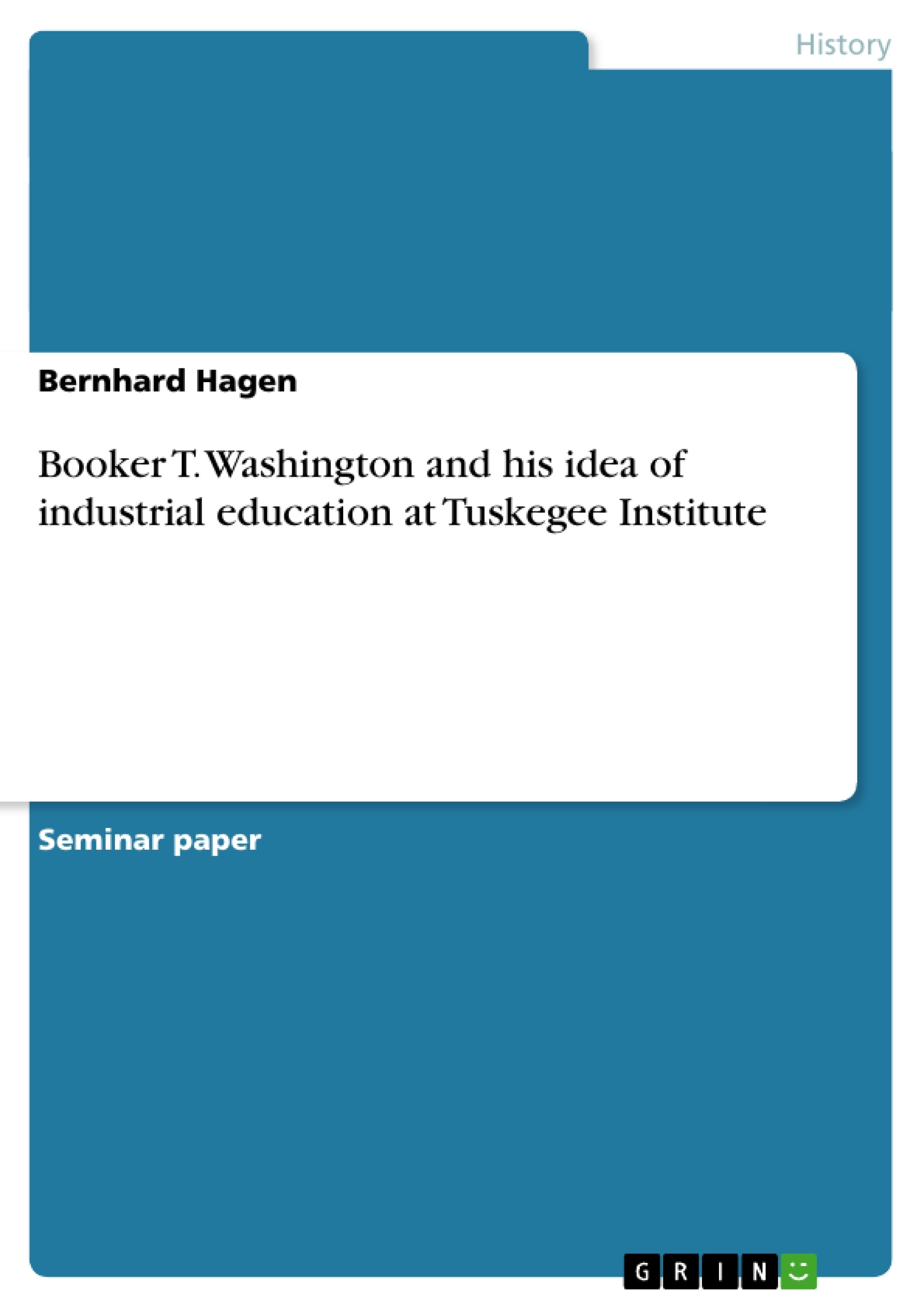Excerpt
Content
I. Introduction
II. The life of Booker T. Washington
II.1. Childhood
II.2. Hampton Institute
II.3. The early years at Tuskegee Institute
II.4. Booker T. Washington’s raise to popularity
III. The ideas of Booker T. Washington
III.1. The importance of work – Industrial Education
III.2. The Success story of Tuskegee
III.3. Religious and Spiritual Goals
IV. Conclusion
V. Literature
I. Introduction
In this term paper I want to discuss the life, the ideas and the influence of Booker Taliaferro Washington. Born as a slave, Booker T. Washington rose to become a well known leader of colored people in the United States. Although he always tried to show other black men and women how to improve their lives, his leadership became controversial. Ironically, his critics argued he would keep the colored people down and he would slow down improvements.
Washington’s most important idea was the “self-education” and “self-help”, and from the founding of Tuskegee Institute in 1881 to his death in 1915 Booker T. Washington tried to realize this idea and was very influential in doing this. The second very influential black leader of that time was William E. B. Du Bois. His concept of the “talented-tenth” represented those who thought that Washington placed too much importance on industrial education. To understand Booker T. Washington’s ideas and concepts it is necessary to take a look at his life. Therefore, I want to show the story of Booker T. Washington, his childhood and his raise to a leader of the colored people in the beginning of this paper. Then I want to discuss the Tuskegee institute and Washington’s approach to the problems of the African-American population.
II. The life of Booker T. Washington
II.1. Childhood
“My life had its beginning in the midst of the most miserable, desolate, and discouraging surroundings.”[1]
The childhood of Booker T. Washington is very important for his later achievements and to understand his ideas and arguments. It was a childhood of poverty, slavery and a lot of hard work. Washington writes that he was born in 1858 or 1859[2], and from his birth on he was the property of a farmer in Virginia. Later researchers found out that his birth date probably was the 5th of April, 1856.[3]Booker T. Washington was “a slave among slaves”[4], that’s how he titled the first chapter of his autobiography. Scholars don’t know much about his father, and Washington wrote “I do not even know his name.” Most likely his father was a white man who lived on one of the near-by plantations.[5]
Booker T. Washington was raised by his mother Jane, and he had to work as early as possible. Because it was illegal for slaves to learn to read and write Washington received no education.
In 1895, in the Atlanta Exposition Address, Washington talked about his childhood:
“Starting thirty years ago with ownership here and there in a few quilts and pumpkins and chickens (gathered from miscellaneous sources), remember the path that has led from these to the inventions and production of agricultural implements, buggies, steam engines, newspapers, books, statuary, carving, paintings, the management of drug-stores and banks, has not been trodden without contact with thorns and thistles.”[6]
This speech was very famous and placed Washington in the spotlight as the leader of his race. But how did he rise to the top?
It was the September of 1862 when President Lincoln issued “The Emancipation Proclamation”, but of course the proclamation could not be enforced until the end of the Civil War in 1865.
“The scene burned itself in on his memory (…) he remembered how the slaves sang, danced (…) they laughed and shouted and clapped each other on the back.”[7]
Now the former slaves were free, but for most of them it quickly became apparent that there was no place to go. All the hopes of the colored people soon turned out to be wrong. And for most African Americans self-help became a major issue.
The late years of the 19th century were also characterized by an increase of racial problems. The Southern racial climate was becoming increasingly inhospitable, and there were more and more lynchings and other acts of violence against the blacks.[8]
Booker T. Washington’s step-father was very fortunate because he found a work in Malden, West Virginia. Booker and his mother and brother John journeyed several hundred miles from the plantation in Franklin County to Malden where they joined his step-father who worked in the salt furnaces and coal-mines.[9]
[...]
[1]Booker T. Washington,Up from Slavery, p. 1.
[2]Up from Slavery, p.1.
[3]Basil Mathews,Booker T. Washington, p. 3.
[4]Up from Slavery, p.1.
[5]Up from Slavery, p.2.
[6]Up from Slavery, p. 157.
[7]Basil Mathews,Booker T. Washington, p. 21.
[8]Lawrence J. Friedman,Life “in the Lion’s Mouth”: Another look at Booker T. Washington, in:Journal of Negro History, Volume 59, Issue 4, Oct. 1974, p. 337.
[9]Up from Slavery, p. 17.
- Quote paper
- Bernhard Hagen (Author), 2002, Booker T. Washington and his idea of industrial education at Tuskegee Institute, Munich, GRIN Verlag, https://www.grin.com/document/29254
Publish now - it's free






















Comments